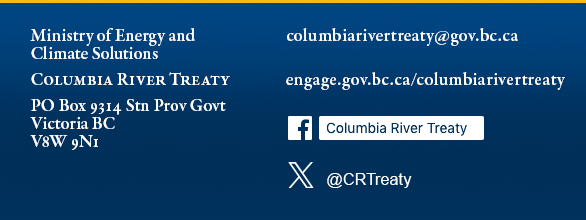Columbia River Treaty
Edition: May 2020

Treaty Negotiations Update
May 28, 2020
On March 11 and 12, 2020, the week before COVID-19 international travel restrictions were put into place, Canadian and American negotiators reconvened in Washington, D.C. to continue discussions about a modernized Columbia River Treaty. This was the ninth round of talks since negotiations started in May 2018.
The two countries returned to the key themes of flood-risk management, power generation and ecosystem function, and exchanges were more focused and comprehensive.
Katrine Conroy, B.C.’s Minister Responsible for the Treaty, described how the discussions are evolving. “The negotiations so far have really been about Canada and the U.S. getting to know each other's priorities and positions around various things relating to the Treaty. They are at a point now of getting into the details of it all. The conversations are getting more specific and challenging.”
Conroy said the Province was “working closely with Global Affairs Canada and Columbia River Basin Indigenous Nations to ensure that what is best for Canada and B.C. will be at the forefront of a modernized Columbia River Treaty.”
The Canadian negotiating team and the Ktunaxa, Secwepemc and Syilx/Okanagan Nations have been working together through video and teleconference to further develop Canadian positions and articulate options that are beneficial to B.C. Canada will continue pressing for increased flexibility in the Treaty to allow operations that meet domestic indigenous, environmental, societal and economic needs more effectively.
The negotiation meetings took place just as concerns about COVID-19 were starting to escalate. As a result, the B.C. public servants who travelled to Washington for the meetings began a 14-day period of self-isolation immediately upon their return. This was consistent with the guidance from B.C.’s Provincial Health Officer.
The next round of Columbia River Treaty negotiation meetings will be scheduled in the near future. If public health concerns persist, Canada and the United States will consider holding the next session by video conference.


